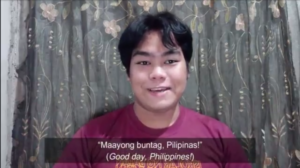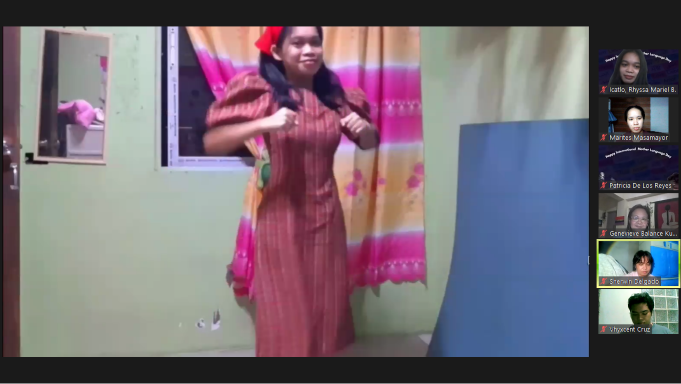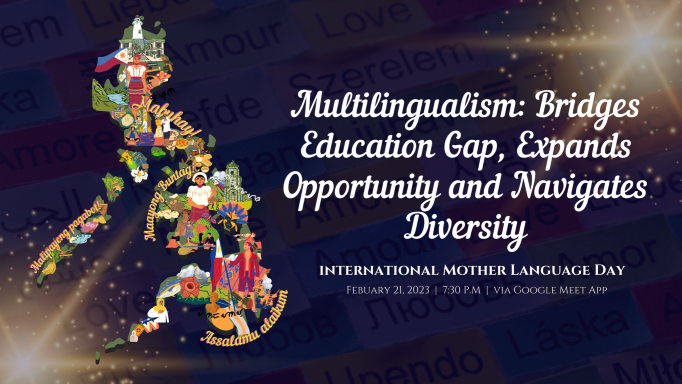by Vhyxcent Andlen P. Cruz and Ma. Patricia Delos Reyes
The Polytechnic University of the Philippines San Juan Campus (PUPSJ) through BSED EN 2-1 Class is wishing all nations a meaningful and delightful International Mother Language Day (IMLD) being celebrated worldwide this February 21.
PUPSJ BSED EN 2-1’s Class organized the event to celebrate International Mother Language Day in the Philippines, which is in the vernacular, Pagdiriwang ng Pandaigdigang Araw ng Wikang Kinagisnan.
The theme for this year’s celebration is “Multilingualism: Bridges Education Gap, Expands Opportunity, and Navigates Diversity”, the first-ever celebration that the BSED EN 2-1 Class experienced to personally manage and catalyze an event for IMLD.

Celebration of the International Mother Language Day with all of the attendees, guests, and speakers of the event spearheaded by BSED EN 2-1 of PUP San Juan.
This program has great significance, particularly for the spearheading class as they are education and language majors. The knowledge they gained here is pivotal for their chosen profession as the next educators in the country.
The hosts, Vhyxcent Cruz and Zainha Montezor kicked off the event energetically, by warmly welcoming attendees of the celebration proper.

Vhyxcent Cruz

Zainha Montezor
A salient part of the event was the multilingual prayer using five languages—Filipino, Ilonggo, Ilocano, Pangasinense, and Arabic, and translated into English. The individuals responsible for the prayer were carefully handpicked to relevantly express multilingualism at the event. In fact, Ms. Ibra, the one who prayed in Arabic, is a fellow from the Muslim community and the rest are from different religious affiliations. Regardless of the differences in beliefs, peace in diversity was achieved.

Multilingual prayer facilitated by a) Bianca Isabelle Macalma (Filipino), b) Marites Masamayor (Ilonggo), c) Harold Solicito (Ilocano), d) Jessica Rebujio (Pangasinense), e) Nor Sophia Ibra (Arabic); followed by the Opening Remarks given by Dr. Genevieve Balance-Kupang.
Dr. Genevieve Balance-Kupang started the event formally by cordially welcoming everyone and calling for an appreciation of diversity, cultural differences, and interconnectedness. Thousands of languages are precious gifts which are something that every nation should be proud of, she added.
This was followed by the first speaker of the program, Ms. Florie Mae Buen. She was a former member of Cecilian Chime School Paper Publication and her English and Computer Club, a Liturgical Apostolate Awardee for Choir, and is currently, a second-year college student taking a Bachelor of Secondary Education Major in English at PUP San Juan.
Ms. Buen emphasized the challenges of the contemporary Philippine education landscape with regard to the issues of maximizing the mother languages of the learners. She mentioned the difficulties of learners in reading comprehension, the lack of materials available in learners’ mother language, the influence of socioeconomic dynamics in the Philippines, the unfortunately overworked yet underpaid teachers, and the dominance of the English language that affects the usage of the mother language of learners. Ms. Buen ended her message with the resolution and recommendations to resolve these challenges.

Ms. Florie Mae Buen emphasizes the shortage of teaching and learning materials as one of the challenges that the Philippine Education System faces.
Afterward, a certificate of appreciation was awarded to Ms. Florie Mae Buen. Then, a euphonic intermission number was delivered by Ms. Patricia Delos Reyes singing ‘Stay Gold’ by the internationally renowned K-Pop boy band BTS.

First intermission number. Patricia Delos Reyes singing Stay Gold of BTS.
Then, a former member of the DYCI Senior Council Student Leaders, former OIC of the Sub-parish Commission on Youth, and the current SPPC Commission Head for Commission for Social Communication, Mr. Michael Cean Villafuerte, delivered his speech.
Mr. Villafuerte accentuated the hurdles of Philippine indigenous learners to access standard quality education. Despite having a Mother Tongue-Based Multilingual Education Program (MTB-MLE) in the country, there are still numerous challenges that indigenous learners face. Mr. Villafuerte calls for the standardization of Philippine education with the inclusion of indigenous epistemology, availability of teaching and learning materials, cultural and linguistic sensitivity, government’s will and response, and recruitment and training of indigenous teachers.

Mr. Michael Cean Villafurte shares his recommendations for the inclusion of indigenous culture in the standardization of Philippine Education.
A certificate of appreciation was then awarded to Mr. Michael Cean Villafuerte. Then, an intermission number was presented by Ms. Rhyssa Mariel Icatlo dancing the Itik-Itik folk dance, a Philippine folk dance that originated in Surigao and was called “Itik-Itik” because folk dance imitates the movements of a duck.

Second intermission number. Rhyssa Mariel Icatlo dancing the Itik-Itik Philippine Folk Dance.
The final keynote speaker is a recipient of the Ashoka Fellow and Hellman-Hammett Award, a journalist by training, and a freedom of expression defender, Mr. Saleem Samad.
Mr. Samad began his speech by emphasizing that languages are vital because it is used to preserve various things, such as culture and history, which are used to educate learners. In this way, learners will know more about their language and its intangible value to the community. Unfortunately, most of the 40% of more than 6,000 languages spoken are already extinct, and only a few hundred languages are used in education. This is evident given the globalization of the world today.

Mr. Saleem Samad, an Ashoka fellow, introduced how vital languages are and how languages
are rapidly depleting weekly. He also discussed the history of how IMLD emerged.
He shared a brief history of the language movement in 1948— when people protested after the birth of Pakistan, to make Bangla— the state language of Bangladesh— its state language rather than Urdu. The youth and students actively participated in the rallies, which angered the Pakistan administration. Five protestors were killed because of police fire and hundreds of people were wounded. After the controversy over Pakistan’s official language, Bangla became one of the state’s languages along with Urdu and the medium of instruction in Pakistan. At the time of the movement, Urdu was Pakistan’s official language, but only the elite and politicians were the ones using the language and the barrier between social classes could be seen. The people living in the Eastern Houston region were looked down upon by the citizens of Pakistan because they were seen as a low-caste Bangla-speaking population. As a result of the discrimination among citizens because of the mother language used, protests continued.
Many people died, lost their homes, and were raped during this war of independence. Then after months of chaos, the new constitution was established in 1972, guaranteeing democracy, secularism, social justice, pluralism, and plural expression. These made a visible impact in Bangladesh and fifty (50) different Adivasis ethnic communities are now able to study the language in schools.
He concluded that language is the most powerful instrument in preserving our tangible and intangible heritage. All are used to promote the dissemination of the mother language which serves not only to encourage multilingual education and linguistic diversity but also to spread awareness about linguistic and cultural traditions to the world. (For the full script of the speaker’s message, here is the link: https://www.youtube.com/watch?v=Ng01jPjsISY)
The certificate of appreciation was awarded to Mr. Saleem Samad for his outstanding participation as the keynote speaker for the event. Then, Ms. Samantha Ursua, President of BSED EN 2-1, gave her closing remarks and took the opportunity to convey gratitude to everyone who gave their effort and time for this event to thrive.
Heartfelt acknowledgment was accorded to PUP San Juan’s Director, Dr. Edgardo Delmo, Academic Program Head, Sir Alfred Pagalilawan, and Office of the Students Affair Head, Sir. Peter Biason for their relentless support and encouragement.
Overall, language and its intricacies are powerful enough to either ruin or build a nation. It takes a handful of sacrifices just to sustain the mother language of everyone. There is beauty in diversity, there is a call for everyone to maintain and preserve the languages they speak. As Mr. Saleem pointed out, once a language vanishes, culture and identity are lost as well for eternity. Without these cultures, the next generations can no longer discover the gems in diversity.
Awareness of multilingualism and linguistic and cultural diversity in education must be maximized to its fullest extent. Provide learners with a language they understand for learning to truly transpire. This expands the opportunities for the learners to develop in various disciplines and navigate a path of tolerance and appreciation of a linguistically and culturally diverse society.
About the Authors:
 Vhyxcent Andlen Cruz is a sophomore English Major student at the Polytechnic University of the Philippines. He is the founder of Feature Archives, an online-based platform where his personal articles are published. An Editorial and Feature/ Literary correspondent for Paraseist, PUPSJ’s Official School Paper Publication. He is devoted to featuring contemporary societal issues through writing to achieve awareness and catalyze relevant change.
Vhyxcent Andlen Cruz is a sophomore English Major student at the Polytechnic University of the Philippines. He is the founder of Feature Archives, an online-based platform where his personal articles are published. An Editorial and Feature/ Literary correspondent for Paraseist, PUPSJ’s Official School Paper Publication. He is devoted to featuring contemporary societal issues through writing to achieve awareness and catalyze relevant change.
 Ma. Patricia De Los Reyes is a sophomore BSED EN student from Polytechnic University of the Philippines, San Juan. She is the Public Image Director of the Rotaract Club of P.U.P – San Juan College of Education year 2022-2023, 2023-2024. She is passionate about sharing different perspectives of life through acting together with people who love to create films.
Ma. Patricia De Los Reyes is a sophomore BSED EN student from Polytechnic University of the Philippines, San Juan. She is the Public Image Director of the Rotaract Club of P.U.P – San Juan College of Education year 2022-2023, 2023-2024. She is passionate about sharing different perspectives of life through acting together with people who love to create films.










